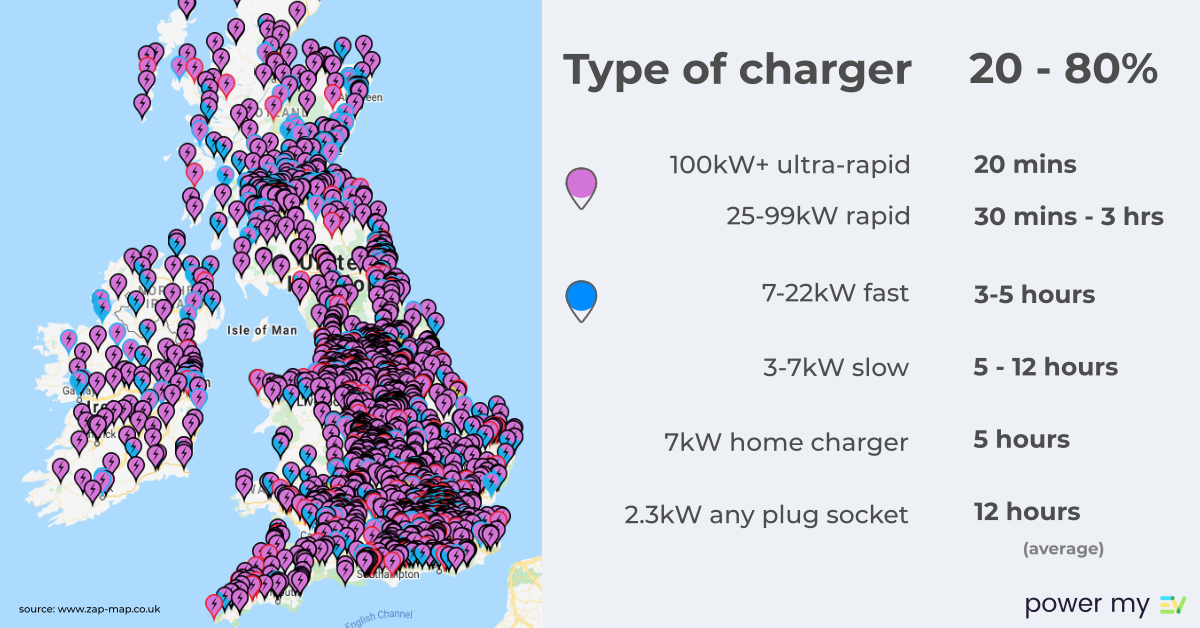The idea of charging an EV at home seems a little alien if you are used to filling up at a petrol station. In fact, home charging can be as easy as plugging into a normal plug socket. Your car will use about as much energy as a kettle boiling when plugged into a home socket. This adds about 8 miles per hour, whereas a dedicated home charge point will charge at around 26 miles per hour.
Most people with an EV do most of their charging at home, but you could also plug your car in at work, while shopping, visiting a destination or at one of the thousands of rapid public chargers across the country.
How long does it take to charge an electric car at home?
As most people come home and charge their cars overnight, the time it takes isn’t usually a problem. You’ll add up to 26 miles per hour if you install a 7kWh home charger. That means you can completely refill a large 74kWh battery in 10 hours.
Overnight charging can work in your favour, too. If you have a smart meter, you can take advantage of variable tariffs and cheap overnight electricity rates by charging your car while you sleep. Guaranteed off-peak rates can be as little as 4 or 5p per kWh, which can make charging your car very cost effective.
Find an energy tariff that fits
Can you plug an electric car into a regular socket?
Yes, you can. Your car will probably come with a cable with a three-pin plug attached that will allow you to charge your car from a regular socket. However, it’s not ideal for all your charging in the long run. To avoid risk, always fully extend the extension lead, and don’t use multiple extension leads.

In the UK there are more public chargers than petrol stations
If you have a car with a particularly large battery and you regularly empty it fully, you might find that you’re not able to charge your car up overnight as a home socket can’t put out enough power. A typical home socket in the UK puts out around 2.3kWh of power. This is considerably less than a typical electric vehicle home charging point, which is capable of putting out up to 7kWh of power.
How much does a home charging point cost?
In the UK, the government offers a grant of up to £350 for anyone having an electric car charging port installed in their home. As a result, the typical cost to the homeowner of having a charging point installed is around £500. This includes the charging point itself, a cable running from the charging point to your electricity supply, as well as other accessories and the cost of labour.
However, if ground works or a cable longer than around 10m are required, this cost may be higher. There are numerous companies who can do this work for you, and we’d encourage you to shop around when obtaining quotes to get the best deal. Standards body the EVCC have shared their handy list of questions you should an installer before getting a home charger.
Explore home chargers
What happens if I don’t have a garage or driveway?
If you don’t have a garage or a driveway, it’s probably not easy for you to fit an electric vehicle charger in your home. This is where electric car ownership becomes a little more difficult – but not impossible. You might be interested to read about the variety of options for charging an EV if you don’t have off-street parking
There is funding available to your local council to install charging points in your street. Various trials are underway looking into electric car charging points that use the electricity supply in your street for lampposts, allowing for electric car charging points to be installed on the street.
How do you charge an electric car away from home?
For a commuter without home charging, you’d ideally be able to charge your electric car at work. An eight hour period is usually more than enough time to charge an electric car to drive back and forth between home and work. However, work charging is not yet the norm, and chances are you’ll have to look elsewhere for an electric vehicle charging point.
With a growing infrastructure of electric car chargers, it’s likely that there is an electric car charging station close to where you live or work. Electric vehicle charging points are becoming better and the network is growing by the day. The fastest, ultra-rapid chargers can charge your car at rates of up to 150kW (compare this to the average 7kW home charger), delivering a huge charge in 20-30 minutes, but at a cost approaching that of a regular tank of fuel.

Asda has led the way with EV charging at many of its large stores
There are some commercial car parks that offer some electric vehicle charging, as well as private car parks in shopping centres and out-of-town stores where you can charge while you shop.
You can find details of all the chargers in an area by downloading the Zap Map app.